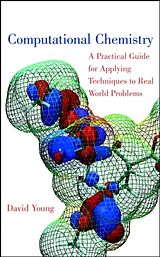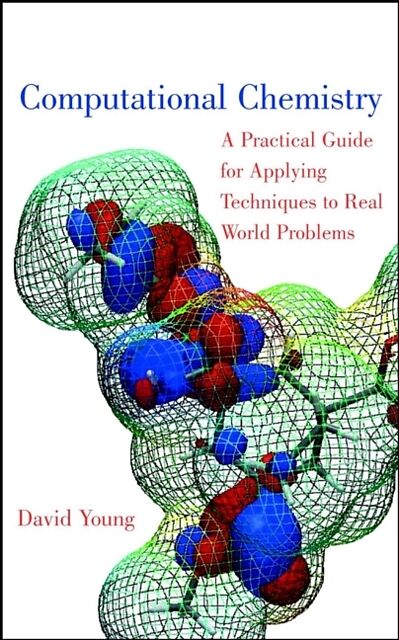Computational Chemistry
Einband:
Fester Einband
EAN:
9780471333685
Untertitel:
A Practical Guide for Applying Techniques to Real World Problems
Genre:
Chemie
Autor:
David Young
Herausgeber:
Wiley
Auflage:
1. Auflage
Anzahl Seiten:
408
Erscheinungsdatum:
12.04.2001
ISBN:
978-0-471-33368-5
Wie wendet man Methoden der Computational Chemistry korrekt auf chemische Alltagsprobleme an? Dieser Band erläutert diese Thematik einprägsam, verständlich und leicht nachvollziehbar. Fortgeschrittene Algorithmen werden mit einem Minimum an mathematischem Formalismus erklärt, unterschiedliche Näherungsansätze in praxistauglicher Form miteinander verglichen. Ein Buch für den Praktiker, der sich schnell einen Überblick verschaffen will, welche Methoden für welches Problem angemessen sind.
Zusatztext "...offers a research guide rather than a primary text...students might find some of the material useful...explains to chemists how to use computational techniques to address real-world research problems." (SciTech Book News! Vol. 25! No. 4! December 2001)"If you're looking for an aggregation of what's out there! and a starting point for further reading or research! then this book does a pretty good job." (Chemweb - Alchemist! 11 February 2002) Informationen zum Autor DAVID YOUNG, PhD, is a scientist with Cytoclonal Pharmaceutics in Dallas, Texas. Prior to joining the team at Cytoclonal, Dr. Young worked as a super-computer analyst for Nichols Research Corporation and Computer Sciences Corporation, and as an affiliate professor of chemistry at Auburn University. Klappentext A complete bench-top guide to basic and advanced techniques used to solve real world research problemsThanks to the proliferation of inexpensive, easy-to-use computational chemistry programs, the average laboratory chemist now has access to powerful tools once reserved solely for highly trained specialists. Computational Chemistry was designed specifically to enable chemists to add computational chemistry techniques to their working arsenal.This book supplies the expert advice and guidance needed to confidently choose and successfully apply the correct computational chemistry techniques to an array of real world scientific problems. Computational chemist David Young provides clear-cut descriptions and step-by-step instructions for solving technical problems. He explores basic techniques in the field with a focus on their relative strengths and limitations. In addition, Young treats a range of advanced techniques from an easy-to-understand, nonmathematical standpoint, including transition structures, reaction coordinates, reaction rates, convergence problems, QM/MM, solvation, nonlinear optical properties, relativistic effects, mesoscale methods, and more.Computational Chemistry features:* Prioritized lists of methods for attacking difficult computational chemistry problems* Brief critical reviews of most commercially available software packages, assessing each for its overall effectiveness and practical utility* A review of the material from the perspective of various chemical systems (such as organic molecules, inorganics, biomolecules, polymers, liquids, or solids) Zusammenfassung Wie wendet man Methoden der Computational Chemistry korrekt auf chemische Alltagsprobleme an? Dieser Band erläutert diese Thematik einprägsam, verständlich und leicht nachvollziehbar. Fortgeschrittene Algorithmen werden mit einem Minimum an mathematischem Formalismus erklärt, unterschiedliche Näherungsansätze in praxistauglicher Form miteinander verglichen. Ein Buch für den Praktiker, der sich schnell einen Überblick verschaffen will, welche Methoden für welches Problem angemessen sind. Inhaltsverzeichnis Preface.Acknowledgments.Symbols Used in This Book.Introduction.BASIC TOPICS.Fundamental Principles.Ab initio Methods.Semiempirical Methods.Density Functional Theory.Molecular Mechanics.Molecular Dynamics and Monte Carlo Simulations.Predicting Molecular Geometry.Constructing a Z-Matrix.Using Existing Basis Sets.Molecular Vibrations.Population Analysis.Other Chemical Properties.The Importance of Symmetry.Efficient Use of Computer Resources.How to Conduct a Computational Research Project.ADVANCED TOPICS.Finding Transition Structures.Reaction Coordinates.Reaction Rates.Potential Energy Surfaces.Conformation Searching.Fixing Self-Consistent Field Convergence Problems.QM/MM.Solvation.Electronic Excited States.Size Consistency.Spin Contamination.Basis Set Customization.Force Field Customization.Structure--Property Relationships.Computing NMR Chemical Shifts.Nonlinear Optical Properties.Relativistic Effects.Band Structures.Mesoscal...
Autorentext
DAVID YOUNG, PhD, is a scientist with Cytoclonal Pharmaceutics in Dallas, Texas. Prior to joining the team at Cytoclonal, Dr. Young worked as a super-computer analyst for Nichols Research Corporation and Computer Sciences Corporation, and as an affiliate professor of chemistry at Auburn University.
Klappentext
A complete bench-top guide to basic and advanced techniques used to solve real world research problems Thanks to the proliferation of inexpensive, easy-to-use computational chemistry programs, the average laboratory chemist now has access to powerful tools once reserved solely for highly trained specialists. Computational Chemistry was designed specifically to enable chemists to add computational chemistry techniques to their working arsenal. This book supplies the expert advice and guidance needed to confidently choose and successfully apply the correct computational chemistry techniques to an array of real world scientific problems. Computational chemist David Young provides clear-cut descriptions and step-by-step instructions for solving technical problems. He explores basic techniques in the field with a focus on their relative strengths and limitations. In addition, Young treats a range of advanced techniques from an easy-to-understand, nonmathematical standpoint, including transition structures, reaction coordinates, reaction rates, convergence problems, QM/MM, solvation, nonlinear optical properties, relativistic effects, mesoscale methods, and more. Computational Chemistry features: * Prioritized lists of methods for attacking difficult computational chemistry problems * Brief critical reviews of most commercially available software packages, assessing each for its overall effectiveness and practical utility * A review of the material from the perspective of various chemical systems (such as organic molecules, inorganics, biomolecules, polymers, liquids, or solids)
Inhalt
Preface. Acknowledgments. Symbols Used in This Book. Introduction. BASIC TOPICS. Fundamental Principles. Ab initio Methods. Semiempirical Methods. Density Functional Theory. Molecular Mechanics. Molecular Dynamics and Monte Carlo Simulations. Predicting Molecular Geometry. Constructing a Z-Matrix. Using Existing Basis Sets. Molecular Vibrations. Population Analysis. Other Chemical Properties. The Importance of Symmetry. Efficient Use of Computer Resources. How to Conduct a Computational Research Project. ADVANCED TOPICS. Finding Transition Structures. Reaction Coordinates. Reaction Rates. Potential Energy Surfaces. Conformation Searching. Fixing Self-Consistent Field Convergence Problems. QM/MM. Solvation. Electronic Excited States. Size Consistency. Spin Contamination. Basis Set Customization. Force Field Customization. Structure--Property Relationships. Computing NMR Chemical Shifts. Nonlinear Optical Properties. Relativistic Effects. Band Structures. Mesoscale Methods. Synthesis Route Prediction. APPLICATIONS. The Computational Chemist's View of the Periodic Table. Biomolecules. Simulating Liquids. Polymers. Solids and Surfaces. Appendix: Software Packages. Appendix 1: Integrated Packages. Appendix 2: Ab initio and DFT Software. Appendix 3: Semiempirical Software. Appendix 4: Molecular Mechanics/Molecular Dynamics/Monte Carlo Software. Appendix 5: Graphics Packages. Apendix 6: Special-purpose Programs. Glossary. Bibliography. Index.

Leider konnten wir für diesen Artikel keine Preise ermitteln ...
billigbuch.ch sucht jetzt für Sie die besten Angebote ...
Die aktuellen Verkaufspreise von 6 Onlineshops werden in Realtime abgefragt.
Sie können das gewünschte Produkt anschliessend direkt beim Anbieter Ihrer Wahl bestellen.
Loading...
Die aktuellen Verkaufspreise von 6 Onlineshops werden in Realtime abgefragt.
Sie können das gewünschte Produkt anschliessend direkt beim Anbieter Ihrer Wahl bestellen.
| # | Onlineshop | Preis CHF | Versand CHF | Total CHF | ||
|---|---|---|---|---|---|---|
| 1 | Seller | 0.00 | 0.00 | 0.00 |
